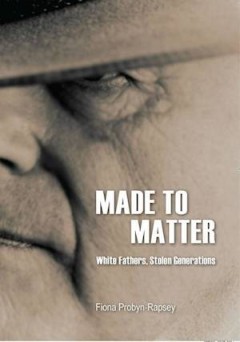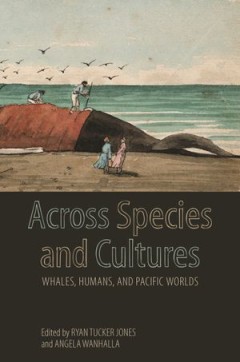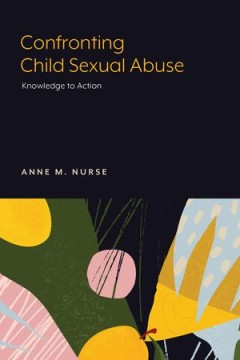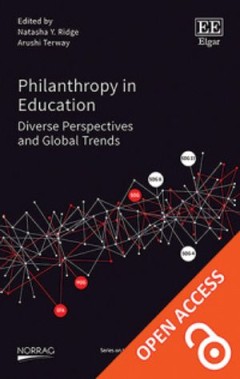Filter by

Made to Matter: White Fathers, Stolen Generations
Most members of the Stolen Generations had white fathers or grandfathers. Who were these white men? This book analyses the stories of white fathers, men who were positioned as key players in the plans to assimilate Aboriginal people by ‘breeding out the colour'. The policy was an cruel failure. It conflated skin colour with culture and assumed that Aboriginal women and their children woul…
- Edition
- -
- ISBN/ISSN
- 9781920899974
- Collation
- -
- Series Title
- -
- Call Number
- 301 PRO m

Belonging and Becoming in a Multicultural World: Refugee Youth and the Pursui…
Children and youth are front and center in the context of global mass migration and the social discord around questions of multicultural inclusion that it often ignites. It is young people at the forefront of navigating the complexities of cultural and ethnic diversity in their everyday lives. Imprecise portrayals of their inclination to either embrace diversity or to incite racism are used to …
- Edition
- -
- ISBN/ISSN
- 9781978803077
- Collation
- -
- Series Title
- -
- Call Number
- 301 MOR b

Dying Unneeded: The Cultural Context of the Russian Mortality Crisis
In the early 1990s, Russia experienced one of the most extreme increases in mortality in modern history. Men's life expectancy dropped by six years; women's life expectancy dropped by three. Middle-aged men living in Moscow were particularly at risk of dying early deaths. While the early 1990s represent the apex of mortality, the crisis continues. Drawing on fieldwork in the capital city during…
- Edition
- -
- ISBN/ISSN
- 9780826519726
- Collation
- -
- Series Title
- -
- Call Number
- 301 PAR d

Practically Invisible: Coastal Ecuador, Tourism, and the Politics of Authenti…
The community of Agua Blanca, deep within the Machalilla National Park on the coast of Ecuador, found itself facing the twenty-first century with a choice: embrace a booming tourist industry eager to experience a preconceived notion of indigeneity, or risk losing a battle against the encroaching forces of capitalism and development. The facts spoke for themselves, however, as tourism dollars be…
- Edition
- -
- ISBN/ISSN
- 9780826520586
- Collation
- -
- Series Title
- -
- Call Number
- 338.4791 SMI p

Across species and cultures (EPUB): Whales, Humans, and Pacific Worlds
More than any other locale, the Pacific Ocean has been the meeting place between humans and whales. From Indigenous Pacific peoples who built lives and cosmologies around whales, to Euro-American whalers who descended upon the Pacific during the nineteenth century, and to the new forms of human-cetacean partnerships that have emerged from the late twentieth century, the relationship between the…
- Edition
- -
- ISBN/ISSN
- 9780824892142
- Collation
- -
- Series Title
- -
- Call Number
- 301 ACR a

The Bronze and Early Iron Ages in Estonia
This book analyses social, economic, and cultural processes during the Bronze and Early Iron Ages (18th century BC – 5th century AD) in what is today Estonia. The above period between the Stone Age (ca. 9000–1800 BC) and the Middle Iron Age (AD 450–800) was an era of significant and crucial developmental processes. The final transition from a foraging to a farming economy occurred during …
- Edition
- -
- ISBN/ISSN
- 9789949117260
- Collation
- -
- Series Title
- -
- Call Number
- -

Body, Personhood and Privacy Perspectives On The Cultural Other and Human Ex…
This book studies how the concepts of body, personhood and privacy can be expanded across disciplinary borders. Notwithstanding the diversity of empirical material and theoretical frameworks, the chapters suggest innovative tools for common key issues: dialogue with the cultural Other, the appropriation of space, and personality. Human embodiment and ethical aspects of representing and regulati…
- Edition
- -
- ISBN/ISSN
- 9789949774593
- Collation
- -
- Series Title
- -
- Call Number
- -

Refugees on the Move: Crisis and Response in Turkey and Europe
Refugees on the Move highlights and explores the profound complexities of the current refugee issue by focusing specifically on Syrian refugees in Turkey and other European countries and responses from the host countries involved. It examines the causes of the movement of refugee populations, the difficulties they face during their journeys, the daily challenges and obstacles they experience, a…
- Edition
- -
- ISBN/ISSN
- 9781800736528
- Collation
- -
- Series Title
- -
- Call Number
- 301 REF r

Confronting Child Sexual Abuse Knowledge to Action
Most people get information about child sexual abuse from media coverage, social movements, or conversations with family and friends. Confronting Child Sexual Abuse describes how these forces shape our views of victims and offenders, while also providing an in-depth look at prevention efforts and current research. Sociologist Anne Nurse has synthesized studies spanning the fields of psychology,…
- Edition
- -
- ISBN/ISSN
- 9781643150338
- Collation
- -
- Series Title
- -
- Call Number
- -

Philanthropy in Education Diverse Perspectives and Global Trends
Challenging commonly held perceptions of philanthropic organisations, this book brings together a range of interdisciplinary contributors from across the globe to explore the most pressing issues facing those working in and with philanthropy and education. It focuses on the increasing influence of new philanthropic actors on the global education sector, offering a thorough insight into the topic.
- Edition
- -
- ISBN/ISSN
- 9781789904123
- Collation
- -
- Series Title
- -
- Call Number
- -
 Computer Science, Information & General Works
Computer Science, Information & General Works  Philosophy & Psychology
Philosophy & Psychology  Religion
Religion  Social Sciences
Social Sciences  Language
Language  Pure Science
Pure Science  Applied Sciences
Applied Sciences  Art & Recreation
Art & Recreation  Literature
Literature  History & Geography
History & Geography